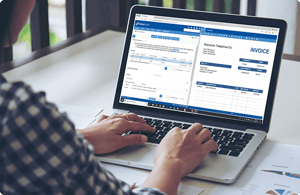Automating New Vendor Setup while Maintaining Internal Controls
Worldwide, more and more accounting tasks are becoming automated. While this can reduce processing time and increase accuracy for your organization,...

Your work environment likely looks a lot different this year compared to 2019, as we all try to adjust to the Covid-19 world. Many accountants are working from home, which presents new challenges and opportunities. The following accounting best practices recognize that people aren’t going to be at their best, adapt to the remote working environment, and balance productivity requirements with the health and well-being of the workforce.
A highly productive on-site accounting team may not show the same performance at home for one or more reasons:
When you adopt new policies and accounting department procedures for your work from home accounting team, make these decisions with the above challenges in mind. Everyone is having a hard time in some form during this pandemic, and being an effective leader in this situation requires a big picture view.
 Unless a client absolutely needs real-time accounting, all work should be processed in batches. The risk of human error is a lot higher when your team is stressed, in a distracting environment, and facing uncertainty in their lives. Batch accounting allows you to build in the accountability and review processes capable of catching errors before they have cause problems. It’s likely that even the most detail-oriented and careful of your workers is going to slip-up more often, as they’ve got a lot on their mind. With more peer review involved in the process, you can add redundancy and more sets of eyes on the batches.
Unless a client absolutely needs real-time accounting, all work should be processed in batches. The risk of human error is a lot higher when your team is stressed, in a distracting environment, and facing uncertainty in their lives. Batch accounting allows you to build in the accountability and review processes capable of catching errors before they have cause problems. It’s likely that even the most detail-oriented and careful of your workers is going to slip-up more often, as they’ve got a lot on their mind. With more peer review involved in the process, you can add redundancy and more sets of eyes on the batches.
You also have the advantage of compartmentalizing the workload, so you can more effectively assign work. Check-in with your team daily to see who currently has the capacity to handle each batch, and make adjustments as needed.
Daily schedules are upended and being available during typical 9-5 hours may be impossible for some of your accounting team. Now’s the time to be as flexible as possible to allow each person to choose their productive work hours.
Some people are at their best in the middle of the night, or know that they can get uninterrupted time during this period. Others may need to take an hour here and there throughout the day. As long as the work is getting done, then each person can figure out what they need to accomplish their tasks.
Remain rigid on deadlines throughout this process, however. If an accountant can’t get the work done in the time allotted, reach out to that person to find out what’s getting in the way of their duties. It’s possible that some of your team may need to drop down to part-time hours or have a significantly reduced workload.
On the other hand, other accountants may end up excelling in a work from home environment. You can shift around the workload to best suit the capacity of your team. While you don’t want to miss deadlines, many clients may be receptive to longer delivery times during the pandemic.
No one knows how long we’re going to be living in a pandemic-stricken world, so establishing the new normal is an essential part of adjusting. Your policies and procedures may need to be significantly rewritten, especially if this is the first time that remote workers are a part of the accounting team.
Daily scrum meetings help keep everyone on the same page without significantly eating into everyone’s workday. They replace more formal and longer meetings, and allow you to see exactly what’s going on with your team.
Another way that you need to recognize the new normal is to set your accountants up for success at their home offices. They may need computer upgrades, webcams, microphones, lighting, and other equipment to allow them to reach their productivity goals. Upgraded internet connections may also be necessary, depending on the type of home service that the person has available.
Finally, you may end up hiring new accountants during the pandemic, especially if the impacts stretch for over a year. Is your onboarding process remote-friendly? You may need to make adjustments to your process. Pairing new hires up with an experienced team member in a mentorship role can also be helpful during this period.
It’s easy to let communication slip when you can’t go up to someone’s desk and talk to them, or reliably reach clients and vendors that are dealing with their own pandemic challenges. Work frequent communication into your processes, such as through a Slack chat channel, as well as group video chats. Make sure that important communications go out via multiple channels so that everyone has this information.
 Reducing the manual and tedious work that your accountants need to do can greatly decrease the amount of errors that they have, as well as allowing them to increase their productivity without working longer hours.
Reducing the manual and tedious work that your accountants need to do can greatly decrease the amount of errors that they have, as well as allowing them to increase their productivity without working longer hours.
The most effective accounting departments had a smooth transition to work from home because of having accounting automation software in place. There are a number of ways that this automation software assists with your newly remote operations.
By automating these key areas of your operation, your accountants can focus on most valuable tasks and reduce the time they need to spend on their typical work duties. When you’re trying to adjust to the Covid-19 world, this is an invaluable tool. We’re all in this together, and you can stay on top of your accounting workload without requiring stressed, time-starved staff to overwork themselves.
Schedule a custom onPhase demo with us today to see how an accounting automation platform can help keep your business processes flowing, improve your team's productivity & enable your remote workforce.

Worldwide, more and more accounting tasks are becoming automated. While this can reduce processing time and increase accuracy for your organization,...

When Ovation Fertility, a collection of independently-thinking IVF and genetics labs, went looking for help with their AP process issues, DocuPhase...

Your accounting team does great work, but are they empowered to do their best? Many inefficient processes drain time away from your staff and make it...